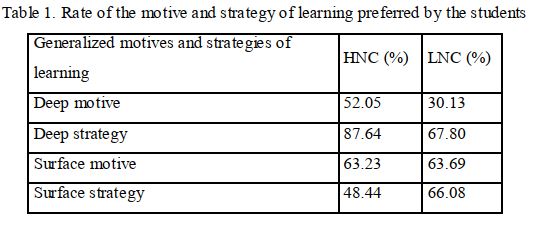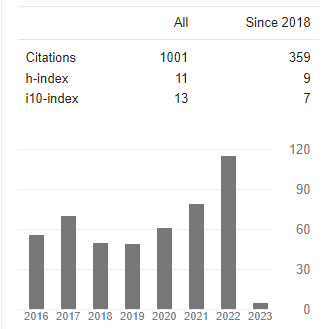MOTIVES AND STRATEGIES OF LEARNING IN STUDENTS WITH DIFFERENT LEVEL OF NEED FOR COGNITION
Abstract
The study was aimed at probing into the motives and strategies of learning in the students varying in the degree of need for cognition. One hundred and fifty six students from the Physical Education Faculty (II semester) at Physical Education Academy in Gdaosk participated in this study. Age of 69 female and 87 male students participating in the study ranged from 19 to 25 years. There were. Subjects were examined with the use of two questionnaires: Cacioppo and Petty Need for Cognition Scale (NCS) in Polish modification by Matusz et al. (2011) and dichotomous version of the Learning Process Questionnaire (R-LPO) by Kember et al., (2004), adapted by Sztejnberg (2008). The results the study showed that the degree of need for cognition in the individuals highly in need for it, determined their motivation and strategies used for learning. Need for Cognition Scale proved to be an effective tool for assessing individual differences in epistemic motivation.
Downloads
References
Cacioppo, J. T. and Petty, R. E. (1982). The need for cognition. Journal of Personality and Social Psychology: 42: 116–131.
Cacioppo, J. T., Petty, R. E., Feinstein, J. A. and Jarvis, W. B. (1996). Dispositional differences in cognitive motivation: The life and times of individuals varying in need for cognition. Psychological Bulletin, 119, 197–253.
Cacioppo, J. T., Petty, R. E., Kao, C. F. and Rodriguez, R. (1986). Central and peripheral routes to persuasion: An individual difference perspective. Journal of Personality and Social Psychology, 51, 1032–1043.
Cacioppo, J. T., Petty, R. E. and Morris, K. J. (1983). Effects of need for cognition on message evaluation, recall, and persuasion. Journal of Personality and Social Psychology, 45, 805–818.
Keller, J.M. (2010). Motivational Design for Learning and Performance. The ARSC Model Approach. Springer Science Business Media, New York.
Kember, D., Biggs, J. and Leung, D. Y. P. (2004). Examining the multidimensionality of approaches to learning through the development of a revised version of the Learning Process Questionnaire. British Journal of Educational Psychology, 74, 261-279.
Maslow, A.H. (1990). Motywacja i osobowość. PAX, Warszawa.
Matusz, P.J., Traczyk, J. and Gasiorowska, A. (2011). Kwestionariusz Potrzeby Poznania - konstrukcja i weryfikacja empiryczna narzędzia mierzącego motywację poznawczą. Psychologia Społeczna, 6, 2, 113-128.
Niemierko, B. (2002). Ocenianie szkolne bez tajemnic. Wydawnictwa Szkolne i Pedagogiczne, Warszawa.
Paris, S.G. and Ayres, L.R. (1997). Stawanie się refleksyjnym uczniem i nauczycielem. Wydawnictwa Szkolne i Pedagogiczne, Warszawa.
Petty, R. E., Cacioppo, J. T. and Goldman, R. (1981). Personal involvement as a determinant of argument-based persuasion. Journal of Personality and Social Psychology, 41, 847–855.
Petty, R. E. and Jarvis, B. G. (1996). An individual difference perspective on assessing cognitive processes. In: N. Schwarz, S. Sudman (ed.), Answering questions: Methodology for determining cognitive and communicative processes in survey research (pp.. 221–257). San Francisco: Jossey-Bass.
Sędek, G. (1995). Bezradność intelektualna w szkole. Wydawnictwo Instytutu Psychologii PAN, Warszawa.
Szewczuk, W. (Ed.), (1979). Słownik psychologiczny. Wiedza Powszechna, Warszawa.
Sztejnberg, A. (2006). Komunikacyjne środowisko nauczania i uczenia się. Wydawnictwo Astrum, Wrocław.
Sztejnberg, A. (2008). Doskonalenie usług edukacyjnych. Podstawy pomiaru jakości kształcenia. Wydawnictwo Uniwersytetu Opolskiego, Opole.
Sztejnberg, A. and Jasiński, T.L. (2015). Wybrane aspekty szkolnego uczenia się. Wydawnictwo Naukowe NOVUM, Płock.
Zimbardo, Ph.G., Johnson, R.L. and McCann, V. (2011). Psychologia. Kluczowe koncepcje. PWN, Warszawa.
Żylińska, M. (2013). Neurodydaktyka. Nauczanie i uczenie się przyjazne mózgowi. Wydawnictwo Naukowe Uniwersytetu Mikołaja Kopernika, Toruń.















